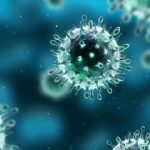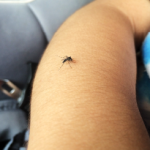The assumption has been that people infected with chikungunya virus will have an acute infection, followed by symptoms that may last for a few months and then go away, Dr. Chang explains. “The striking thing we are seeing is that patients are describing these persistent symptoms. There have been suggestions that the patients have developed osteoarthritis in the meantime or some other related arthritis, but when you talk to the patients it is quite striking. They tell you that they have pain in specific joints where they never had problems before they got chikungunya.”
Dr. Chang and colleagues have studied whether CHIKV persists in the synovial fluid of patients after infection, which could act as a causative mechanism of persistent arthritis. Their cross-sectional study, published in Arthritis & Rheumatology in April, included 38 Colombian patients who had confirmed chikungunya virus infection during the same epidemic and had chronic arthritic symptoms.3 The control group included 10 people in the same locations who had not been diagnosed with the disease.
The study’s hypothesis was that persistent active chikungunya virus is responsible for chronic arthritis and joint pain, and that viral RNA would appear in the synovial fluid. Previous research had found chikungunya virus antigen in macrophages and chikungunya virus RNA in synovial biopsy tissue 18 months after chikungunya virus infection in a single subject.4 But the research conducted by Dr. Chang and colleagues found no viable virus after culture of synovial fluid in any of the participants a median of 22 months after infection.
“You could conclude one of two things: Either there is no virus in the joint, or there is virus in the synovial tissue that can’t be found in the fluid,” Dr. Chang explains. “If there was a lot of virus in the tissue, you would see viral proteins, etc., in the synovial fluid. If there is virus still in there, it would be at extremely low levels we weren’t able to pick up.
“The other option, which is probably more likely, is that the chikungunya virus has been cleared from the joint, but the patients are now experiencing an immune response to chikungunya and have arthritis caused by this immune response,” she says. “There does not yet appear to be a definitive mechanism for why patients two to three years later complain of persistent arthritis in the absence of virus there.”
According to Dr. Mahalingam and colleagues, research has been unable to isolate infectious virus from tissue or sera in mouse models and human studies. Human studies have demonstrated high levels of CHIKV-specific IgM up to 180 days in patients with no preexisting musculoskeletal disease prior to infection, suggesting that persistence of viral antigens could contribute to development of chronic chikungunya arthritis, “but the underlying molecular mechanisms are still unknown, and a statistical association between persistent CHIKV-specific IgM and chronic arthralgia has not been established.”
Treatment Options
No standard of care guidance exists in the U.S. for treating the disease. Some patients are treated with immunomodulating medications, such as methotrexate, sulfasalazine, disease-modifying anti-rheumatic drugs (DMARDs) and tumor necrosis factor (TNF) alpha inhibitors, despite ongoing concern that such agents could prove harmful when a virus is replicating in the synovium and potentially facilitate reemergence of a systemic viral infection, although no such cases have yet been reported, Dr. Chang notes.

